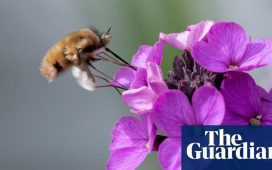The controversial Carmichael coalmine has been delayed indefinitely by the Queensland government, which has ruled that Adani’s proposals to protect the endangered black-throated finch do not meet the miner’s approval conditions.
The decision, made by the state environment department and not by the political arm of government, forces Adani to complete significant additional work before it can begin construction of the mine.
“The position is based on the best available science,” the department said.
The finch management plan is one of two key hurdles before Adani can start work on its mine. The second is a groundwater plan, which also requires state approval and is under review.
In a statement, the department said it was seeking a number of new commitments from Adani, including that the company gathers more accurate information about the black-throated finch population “which is vital to effectively manage and monitor the impacts of the project on the … finch and essential habitats in the project area”.
The department is also seeking a commitment by Adani that it would undertake only limited grazing in a conservation area set aside for the finch population. The company’s conservation plans were previously criticised by finch experts and ecologists as “a plan to manage a cow paddock”.
While the decision was welcomed by environmentalists, amid an election campaign where Adani’s coal project has become a significant issue, it does not amount to a rejection or a block on the Carmichael mine. In some respects, the advice from the department offers Adani a clear path to approval of the plan, by outlining the actions authorities require.
The department said Adani could gain approval for a revised plan simply by making commitments to undertake additional actions. “Timeframes associated with the approval of the [finch plan] now rest with Adani,” the department said.
“Adani needs to consider [the department’s] advice and make appropriate amendments to the [plan] before submitting a revised version for the department to assess.
“Whilst [the department] has set out clear commitments that Adani is expected to make in the [plan], the activities do not need to be carried out before [it] can be approved.”
The finch has been at the centre of a highly charged debate in Queensland since January, when the department convened an expert panel to review Adani’s plans and provide recommendations to government. Adani complained that this process was unfair, as it had been working based on departmental advice for the previous 18 months.
The federal government signed off on Adani’s finch management plan last year, and on a groundwater plan in the days before the election was called.
Doing so placed a renewed focus on the state approvals and gave Liberal National party MPs and candidates in regional Queensland the ability to criticise the state Labor government for delaying the project.
News Corp newspapers continue to link the deputy premier and treasurer, Jackie Trad, an influential member of the state’s left faction, to the approvals process despite it being conducted by public servants and outside her portfolio areas.
An Adani spokeswoman told the Australian the company had met with representatives from the department yesterday and “left the meeting still no clearer on the process or timing to finalise these plans”.
“In relation to the [finch] plan, the department provided some correspondence. On first pass it reads more like a wish-list generated from the [expert’s] report rather than feedback that corresponds with our conditions and is science-based.”
The Australian Conservation Foundation welcomed the department’s decision. “The black-throated finch is on the verge of extinction and these coalmines would totally destroy or degrade most of the high-quality finch habitat that’s left,” said the ACF’s Stop Adani campaigner, Christian Slattery.
“A recent scientific paper in the Environmental Science and Policy journal set out how the endangered finch, which was once widespread across north-eastern Australia, is no longer found in 88% of its former range.
“The area where Adani wants to dig the Carmichael mine is home to the largest known population of black-throated finches and some of the best remaining habitat.
“Adani says the approvals for its mine are subject to the strictest environmental conditions in history, but these conditions are only meaningful if they are backed by credible management plans. Adani has relentlessly attacked and undermined the scientists who conducted an expert review of its black-throated finch management plan.”













